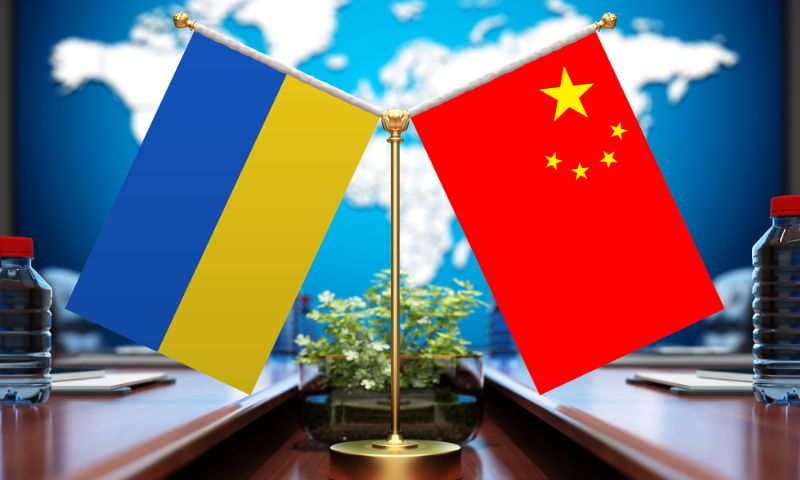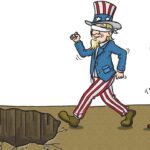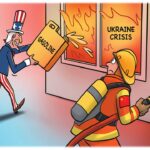Chinese special envoy will be sent to mediate, seek political solution
Chinese President Xi Jinping and Ukrainian President Volodymyr Zelenskyy held a phone call on Wednesday at the invitation of the latter, during which the two leaders exchanged views on China-Ukraine relations and the Ukraine crisis.
Chinese analysts said that China will engage more on the diplomatic front to contribute to a political settlement of the Ukraine crisis, and the role that China could play has been sincerely welcomed by both Kiev and Moscow, despite some voices from the West, especially the US, that have tried to distort China’s mediation efforts.
Xi said in the phone call that China will send a special representative of the Chinese government on Eurasian affairs to visit Ukraine and other countries to conduct in-depth communication with all parties on the political settlement of the Ukraine crisis, according to the Xinhua News Agency.
Xi stressed that China, a permanent member of the UN Security Council and a responsible major country, will not choose to be a bystander to the Ukraine crisis, or “add fuel to the fire,” or use the crisis as an opportunity to make profit.
“On the Ukraine crisis, China always stands on the side of peace, and China’s core position is to promote peace via talks,” Xi noted.
Everything China does is aboveboard. Dialogue and negotiation are the only viable way forward. There is no winner in nuclear wars, the Chinese president said.
Zelenskyy congratulated President Xi on his re-election and commended China for its remarkable achievements. He expressed confidence that under the leadership of President Xi, China will successfully address various challenges and continue to move forward. China upholds the purposes and principles of the UN Charter in international affairs and has significant influence on the international stage.
The Ukrainian side is committed to the one-China policy, and hopes to advance all-round bilateral cooperation with China, open up a new chapter in Ukraine-China relations, and jointly safeguard world peace and stability. Zelenskyy shared his views on the current state of the Ukraine crisis with the Chinese president. He thanked China for providing humanitarian assistance to Ukraine and welcomed China’s important role in restoring peace and seeking diplomatic solution to the crisis.
Mutual respect for sovereignty and territorial integrity is the political foundation of China-Ukraine relations, Xi said. “China’s readiness to develop relations with Ukraine is consistent and clear-cut. No matter how the international situation evolves, China will work with Ukraine to advance mutually beneficial cooperation,” said the Chinese president.
Chinese analysts said the call readout shows that Ukraine holds a different attitude toward China’s mediation efforts compared to the US. On March 21, White House National Security Council spokesperson John Kirby told reporters that the US does not see China as capable of being an impartial mediator between Russia and Ukraine.
Experts said this shows that the US has failed to provide hope of a peaceful solution for the relevant parties, including Ukraine, Russia and other European countries, and this is why even Kiev, who received weapons from the US and NATO, is now seeking dialogue and the possibility of political settlement from China.
Zelenskyy on Wednesday appointed Pavlo Ryabikin, a former minister of strategic industries, as Ukraine’s new ambassador to China, according to a decree posted on the website of the Ukrainian president.
From calls to actions
Wang Xiaoquan, an expert from the Institute of Russian, East European and Central Asian Studies at the Chinese Academy of Social Sciences, told the Global Times on Wednesday that the phone call upon the invitation of Ukraine demonstrates that the country attaches great importance to its ties with China and recognizes the country’s major role in solving the Ukraine crisis.
“China has become an influential mediator that is recognized by Ukraine and Russia as well as France and Germany, meaning China’s stance over the crisis is fair and objective and China is a responsible major power seeking no individual interests,” Wang noted.
The diplomacy between the heads of states is a way to open the channel, create an atmosphere, and then guide the direction, and there are still many specific problems that need to be solved at the working level, like the role played by the Chinese special envoy on Eurasian affairs, Cui Hongjian, director of the Department of European Studies at the China Institute of International Studies, told the Global Times on Wednesday.
The envoy will solve the problems in line with this direction, and this will make the Chinese side understand this situation more concretely and comprehensively, helping China to better promote political solutions, Cui noted. “I think there will be more specific measures in the plan in the future,” he said.
China has successfully mediated tensions between Saudi Arabia and Iran, brokering a deal between the two formerly hostile countries which allowed the resumption of diplomatic ties earlier this year.
In a 12-point position paper called “China’s Position on the Political Settlement of the Ukraine Crisis,” issued on the one-year anniversary of the Russia-Ukraine military conflict in February, the Chinese Foreign Ministry called for ceasing hostilities and resuming peace talks, stopping unilateral sanctions and abandoning the Cold War mentality.
It also called for respecting the sovereignty of all countries and expressed opposition to the use of nuclear weapons.
Experts said that the Chinese government’s special representative could bring a significant breakthrough for a political settlement to the Ukraine crisis.
“Both Ukraine and Russia have welcomed China’s effort to promote a cease-fire and a political solution to the crisis. China didn’t fuel the flames, provide weapons to either side or attack them, which is why China has the channel to speak to both Russia and Ukraine,” said Zhang Hong, an associate research fellow at the Institute of Russian, Eastern European and Central Asian Studies of the Chinese Academy of Social Sciences, adding that Beijing is a qualified mediator for the crisis.
But mediation of the Ukraine crisis is more difficult and more complicated than the Iran-Saudi deal, because the two major Middle Eastern powers did not directly fight each other, and Riyadh and Teheran have strategic autonomy and are able to make independent strategic decisions. However, Kiev has been deeply affected by Washington, Zhang said. Therefore, it could be too early to set high expectation for a peaceful solution immediately, and the whole peace process will take time, said experts.
Li Haidong, a professor at the Institute of International Relations at the China Foreign Affairs University, told the Global Times on Wednesday that since 2022, many countries including Belarus and Turkey have tried to mediate the conflict between Russia and Ukraine, but these efforts have not realized meaningful results and the conflict is still far from over. This makes both Kiev and Moscow, as well as other parties concerned by the crisis, seek hope from another mediator with credible influence and sincerity.
Before the phone call with the Ukrainian president, the Chinese leader has spoken with many leaders of relevant parties, including Russia, Germany, France and the EU, as well as neutral third parties like Brazil, and this made conditions for a dialogue between Xi and Zelenskyy more mature, Li said. “It shows that China is sincerely prepared for mediation efforts,” he said.
Now that Ukraine shows a similar attitude to China’s mediation with other relevant parties on the continent of Europe, like the EU and France, who really want the conflict to be stopped, Kiev has perhaps started to realize that US and NATO military support cannot effectively protect Ukraine or stop the bloodshed, but will only prolong the conflict. This might bring some hope as Kiev might start to act more independently and make pragmatic decisions based on its own judgments, said experts.
(Global Times)




